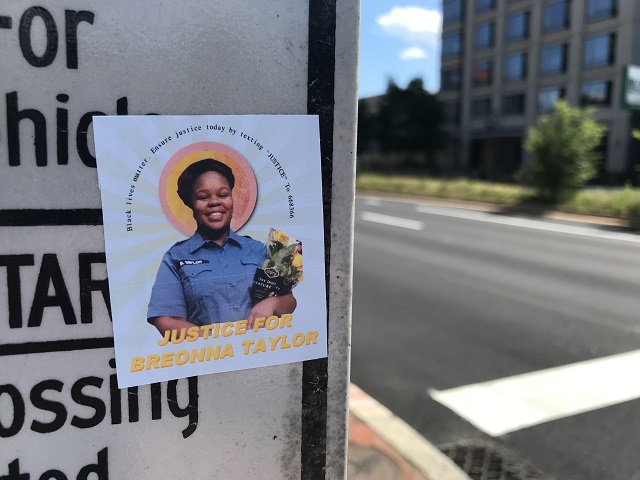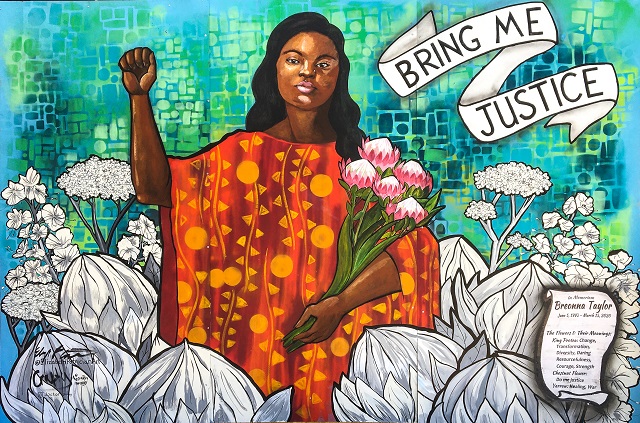Breonna Taylor: If Black lives matter, black deaths should matter too Comment
New in Ceasefire, Politics - Posted on Tuesday, September 29, 2020 12:06 - 0 Comments

(Credit: Daniel Lobo, licensed under Creative Commons)
“This is the legacy of racist power, constructing the Black Race biologically and ethnically and presenting the Black body to the world first and foremost as a ‘beast’, to use Gomes de Zurara’s term, as violently dangerous, as the dark embodiment of evil. Americans today see the Black body as larger, more threatening, more potentially harmful, and more likely to require force to control than a similarly sized White body, according to researchers. No wonder the Black body had to be lynched by the thousands, deported by the tens of thousands, incarcerated by the millions, segregated by the tens of millions.” — Ibram X Kendi
Last week, none of the three officers involved in the fatal shooting of Breonna Taylor were indicted for her murder. There was a sole charge of wanton endangerment – for shooting into the wall of another apartment. There has since been outrage, protests, and an emboldening of right-wing militias. There has also been plenty of that rhetorical dog-whistle for white supremacist violence: law and order.
Somehow, the verdict is both shocking and normal. On one hand, anyone with a conscience is abhorred. The lack of indictments seems to imply that Ms. Taylor somehow is responsible for her own death, since no one else is. Ms. Taylor’s family received a wrongful death settlement, yet paradoxically, no one was found wrongful in her death. That sole charge of wanton endangerment shows that property has more value than a Black woman’s life. And yet, after Eric Garner, Sandra Bland, Rekia Boyd, Tamir Rice, and countless others, this has become routine. Police violence has become ubiquitous. As much as we resist becoming despondent, we know the pattern, including the lack of consequences for law enforcement.
What has also become custom is the response of those on the Right. To argue that it was tone-deaf would be to underplay the seriousness of racialized violence. Defending the police officers and arguing that the case is “more complicated” than seems at face value (as argued by conservatives such as Tomi Lahren and Charlie Kirk) is a distraction. White supremacy operates on denial. If you engage in whataboutism and point to “looting”, you are simply avoiding the myriad of statistics that show the systemic nature of state violence towards Black people.
Never mind that this same right wing is forever warning against government overreach and glorifying the Second Amendment, they fell silent on Philando Castile. White supremacy cares about self-maintenance, not unambiguous morality. That is its sole philosophical principle.
And, once again, we hear that same contrived phrase, “law and order”, which pretends to be colour-blind but is rooted in systemic racism and is intended to silence and gaslight those who might question it. This is nothing new, of course. As documented by historian Jeremy D. Meyer (2002), the shift in the public conversation regarding riots had provided a convenient cover for white supremacist state violence during the Nixon administration.
Oblivious liberals seem to take great pleasure in laughing at Trump’s apparent stupidity (“covfefe” etc), even as his presidency opens a gateway to fascism. If anything, the president has been cunning and pragmatic in his use of terminology to legitimise racism and xenophobia. As Michelle Alexander shows in The New Jim Crow, “colour-blind” racist policies are successful because they are rooted in a sort of plausible deniability; their advocates argue that they are not racist because they don’t mention race. One can look at a myriad of racial inequities and note that the policies that created them never explicitly mention any racial group.
Breonna Taylor deserved so much more, as do all victims of white supremacy. Sadly, we have become depressingly accustomed to these cycles of racial injustice. One cannot even utter the words “Black lives matter” without eliciting the predictable homilies about “all” or “blue” lives – as if being a police officer is morally analogous to 400 years of systemic racist violence. The message here is clear: Black lives do not matter in this country. This is the legacy of racist power.
But we will not be silent. We will keep marching and protesting, because there is no alternative.

(Credit: Annette Bernhardt, licensed under Creative Commons)



Leave a Reply